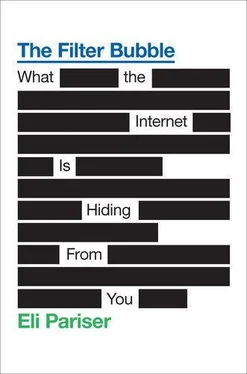meaning threats
mean world syndrome
MeetUp
Metcalfe, Bob
Metcalfe’s law
Microsoft
Bob
Live
middleman, elimination of
Migra corridos
Milgram, Stanley
Mill, John Stuart
Minority Report
Moore’s law
MORIS
Moses, Robert
mousetraps
MoveOn
Mulvenon, James
MySpace
Nabokov, Vladimir
National Rifle Association (NRA)
National Security Agency (NSA)
Nauman, Arthur
Ne’eman, Yuval
Negroponte, Nicholas
Nemeth, Charlan
Netflix
Netflix Challenge
Newmark, Craig
news
Facebook feeds
Google News
people-powered
Yahoo News
newspapers
editorial ethics and
ombudsmen and
New York Times
9/11
Nordhaus, Ted
Norvig, Peter
Nosenko, Yuri
Obama, Barack
Oceana
“Of Sirens and Amish Children” (Benkler)
OkCupid
Olson, Carrie
Oswald, Lee Harvey
overfitting
Pabst
Page, Larry
PageRank
Palmer, Chris
Palo Alto Research Center (PARC)
Pandora
PanelDirector
Pareles, Jon
Parker, Sean
Pattern Language, A (Alexander et al.)
PayPal
PeekYou
persuasion profiling
Phantom Public, The (Lippmann)
Philby, Kim
Phorm
Piaget, Jean
Picasa
Picasso, Pablo
PK List Management
Plato
politics
electoral districts and
partisans and
programmers and
voting
Popper, Karl
postmaterialism
predictions
present bias
priming effect
privacy
Facebook and
facial recognition and
genetic
Procter & Gamble
product recommendations
Proulx, Travis
Pulitzer, Joseph
push technology and pull technology
Putnam, Robert
Qiang, Xiao
Rapleaf
Rather, Dan
Raz, Guy
reality
augmented
Reality Hunger (Shields)
Reddit
Rendon, John
Republic.com (Sunstein)
retargeting
RFID chips
robots
Rodriguez de Montalvo,
Garci
Rolling Stone
Roombas
Rotenberg, Marc
Rothstein, Mark
Rove, Karl
Royal Caribbean
Rubel, Steve
Rubicon Project
Rumsfeld, Donald
Rushkoff, Douglas
Salam, Reihan
Sandberg, Sheryl
schemata
Schmidt, Eric
Schudson, Michael
Schulz, Kathryn
science
Scientific American
Scorpion
sentiment analysis
Sentry
serendipity
Shields, David
Shirky, Clay
Siegel, Lee
signals
click
Simonton, Dean
Singhal, Amit
Sleepwalkers, The (Koestler)
smart devices
Smith, J. Walker
social capital
social graph
Social Graph Symposium
Social Network, The
Solove, Daniel
solution horizon
Startup School
Steitz, Mark
stereotyping
Stewart, Neal
Stryker, Charlie
Sullivan, Danny
Sunstein, Cass
systematization
Taleb, Nassim Nicholas
Tapestry
TargusInfo
Taylor, Bret
technodeterminism
technology
television
advertising on
mean world syndrome and
Tetlock, Philip
Thiel, Peter
This American Life
Thompson, Clive
Time
Tocqueville, Alexis de
Torvalds, Linus
town hall meetings
traffic
transparency
Trotsky, Leon
Turner, Fred
Twitter
Facebook compared with
Últimas Noticias
Unabomber
uncanny valley
Upshot
Vaidhyanathan, Siva
video games
Wales, Jimmy
Wall Street Journal
Walmart
Washington Post
Web site morphing
Westen, Drew
Where Good Ideas Come From (Johnson)
Whole Earth Catalog
WikiLeaks
Wikipedia
Winer, Dave
Winner, Langdon
Winograd, Terry
Wired
Wiseman, Richard
Woolworth, Andy
Wright, David
Wu, Tim
Yahoo
News
Upshot
Y Combinator
Yeager, Sam
Yelp
You Tube
LeanBack
Zittrain, Jonathan
Zuckerberg, Mark
Advance Praise for The Filter Bubble
“Internet firms increasingly show us less of the wide world, locating us in the neighborhood of the familiar. The risk, as Eli Pariser shows, is that each of us may unwittingly come to inhabit a ghetto of one.”
—Clay Shirky, author of
Here Comes Everybody and
Cognitive Surplus
“‘Personalization’ sounds pretty benign, but Eli Pariser skillfully builds a case that its excess on the Internet will unleash an information calamity—unless we heed his warnings. Top-notch journalism and analysis.”
—Steven Levy, author of
In the Plex: How Google Thinks, Works and Shapes Our Lives
“The Internet software that we use is getting smarter, and more tailored to our needs, all the time. The risk, Eli Pariser reveals, is that we increasingly won’t see other perspectives. In The Filter Bubble, he shows us how the trend could reinforce partisan and narrow mindsets, and points the way to a greater online diversity of perspective.”
—Craig Newmark, founder of craigslist
“Eli Pariser has written a must-read book about one of the central issues in contemporary culture: personalization.”
—Caterina Fake, cofounder of flickr and Hunch
“You spend half your life in Internet space, but trust me—you don’t understand how it works. Eli Pariser’s book is a masterpiece of both investigation and interpretation; he exposes the way we’re sent down particular information tunnels, and he explains how we might once again find ourselves in a broad public square of ideas. This couldn’t be a more interesting book; it casts an illuminating light on so many of our daily encounters.”
—Bill McKibben, author of
The End of Nature and
Eaarth and founder of 350.org
“ The Filter Bubble shows how unintended consequences of well-meaning online designs can impose profound and sudden changes on politics. All agree that the Internet is a potent tool for change, but whether changes are for the better or worse is up to the people who create and use it. If you feel that the Web is your wide open window on the world, you need to read this book to understand what you aren’t seeing.”
—Jaron Lanier, author of
You Are Not a Gadget
“For more than a decade, reflective souls have worried about the consequences of perfect personalization. Eli Pariser’s is the most powerful and troubling critique yet.”
—Lawrence Lessig, author of
Code, Free Culture, and
Remix
“Eli Pariser isn’t just the smartest person I know thinking about the relationship of digital technology to participation in the democratic process—he is also the most experienced. The Filter Bubble reveals how the world we encounter is shaped by programs whose very purpose is to narrow what we see and increase the predictability of our responses. Anyone who cares about the future of human agency in a digital landscape should read this book—especially if it is not showing up in your recommended reads on Amazon.”
—Douglas Rushkoff, author of
Life Inc. and
Program or Be Programmed
“In The Filter Bubble, Eli Pariser reveals the news slogan of the personalized Internet: Only the news that fits you we print.”
—George Lakoff, author of
Don’t Think of an Elephant! and
The Political Mind
“Eli Pariser is worried. He cares deeply about our common social sphere and sees it in jeopardy. His thorough investigation of Internet trends got me worried, too. He even taught me things àbout Facebook. It’s a must-read.”
Читать дальше











